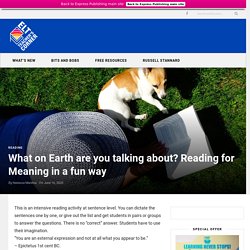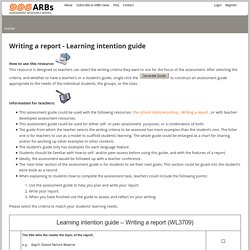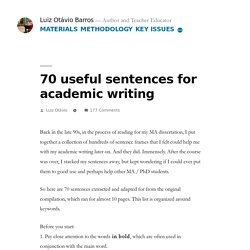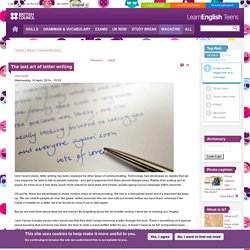

English Skills - Writing. What on Earth are you talking about? Reading for Meaning in a fun way - Teacher´s Corner. This is an intensive reading activity at sentence level.

You can dictate the sentences one by one, or give out the list and get students in pairs or groups to answer the questions. There is no “correct” answer. Students have to use their imagination. “You are an external expression and not at all what you appear to be.” – Epictetus 1st cent BC. Top 10 Writing Graphic Organizers Gallery. Video Writing Prompts – High-Interest Writing Promtps. Different Text Types - A1 to C1 Levels - Learning how to write well. Writing activities. Report genre. Report Writing. Writing a report - Learning intention guide. How to use this resource: This resource is designed so teachers can select the writing criteria they want to use for the focus of the assessment.

After selecting the criteria, and whether to have a teacher's or a student's guide, single click the to construct an assessment guide appropriate to the needs of the individual students, the groups, or the class. Information for teachers: This assessment guide could be used with the following resources: The school stationery shop , Writing a report , or with teacher-developed assessment resources. Exercises. The Most Dangerous Writing Prompts. Pre-intermediate A2 writing. Bad News. MINI LESSON: I Write About... – Write About. 70 useful sentences for academic writing.
Back in the late 90s, in the process of reading for my MA dissertation, I put together a collection of hundreds of sentence frames that I felt could help me with my academic writing later on.

And they did. Immensely. After the course was over, I stacked my sentences away, but kept wondering if I could ever put them to good use and perhaps help other MA / PhD students. So here are 70 sentences extracted and adapted for from the original compilation, which ran for almost 10 pages. This list is organized around keywords. Before you start:1. Arguea. Claima. Data a. Debate a. The lost art of letter writing. Over recent years, letter writing has been replaced by other ways of communicating.

Technology has developed so rapidly that we now expect to be able to talk to people instantly - and get a response from them almost straight away. Rather than putting pen to paper, for most of us it now feels much more natural to send texts and emails, quickly typing out our message within seconds. Of course, there are advantages to these modern ways of communicating. We live in a fast-paced world and it’s important we keep up. We can chat to people all over the globe, within seconds! But do we ever think about what we are losing? I don’t know a single person who would say that they didn’t enjoy receiving a letter through the post. And it’s not only the person receiving the letter who will benefit from a lovely envelope appearing through their door. Let’s begin the letter writing revolution! English for Emails. Creative writing with Pixar. ProWritingAid - Writing Improvement & Editing Software.
Write and Improve: An Online writing helper. Writing is probably the most difficult area for learners to improve on by themselves.

Writing demands an audience and if you have no-one to tell you how successful your efforts are – or not – then you are doomed to repeat your failures into eternity. Cambridge English have, however, just released a beta version of an online, browser based writing helper. Currently free to use and requiring only a facebook login (or email registration), the service allows learners to input their answers to one of the five questions provided (or submit a piece of writing of their own choice) and to get feedback on their efforts. In the screenshot above, the highlighted text at the bottom of the image is the submitted text. The colour coding represents the program’s opinion of the learner level the different sections of the text represent. It’s worth remembering that this is still in the stages of testing and ironing out initial problems – and there are quite a few things that I think need improving! How to help children love writing in English. Roseli Serra, winner of the TeachingEnglish monthly blog award, writes about how to encourage children learning English to love writing in English too.

One of the biggest challenges teachers have faced in the classroom has to do with writing. Usually students do not want to write, because they have never been encouraged to do it or to enjoy it. It’s worth remembering that most people never write anything of any length in their daily lives, or anything using a pen and paper, or without using a spellchecker. But this is often what we ask our students to do in English. Writing, like all other aspects of language, is communicative. I have noticed that early on, children in language schools often enjoy the beginning stages of writing, when they are learning the letters or characters.
So what can we do to help children retain their early interest in writing, while they develop skills and confidence? Age plays a crucial role in what we teach and how we teach it. 1. Writing for a Purpose.